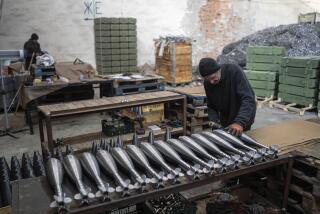O.C. Company Is Among Few to Invest in Russia’s Drug Firms
- Share via
ST. PETERSBURG, Russia — This country’s pharmaceuticals industry is sick, and big injections of cash are needed for the patient to recover, Russian and Western experts say.
“Russia’s medical sector is in such bad shape that improvement just has to come,” Richard Smith, general director of Geneva-based Eli Lilly Exports, told a recent pharmaceutical conference in St. Petersburg. “But it will be slow.”
Russian drug manufacturers, like most other industrial sectors, suffer from a host of ailments, from underinvestment to outmoded equipment.
Drug shortages are epidemic and distribution networks have all but collapsed since the 1991 breakup of the Soviet Union.
“There are no funds and no distribution systems to replace what was,” said Alexander Apazov, president of the Russian Pharmaceutical Assn., which groups Russian drug makers. “We desperately need foreign investment.”
But foreign firms have been slow to invest in Russia’s 93 pharmaceutical factories, virtually none of which currently operate under Western quality standards.
One exception to the investment rule is the St. Petersburg-based October pharmaceuticals factory, where Costa Mesa-based ICN Pharmaceuticals Inc. traded 30,000 of its American Stock Exchange-listed shares for a 15% equity stake last year.
Baxter International Inc. has spent $10 million developing a Moscow manufacturing plant.
Other foreign drug manufacturers complain about bureaucratic customs problems and other barriers to trade.
Today, with factory output plummeting as manufacturers struggle to adapt to a market-oriented economy, the country must import more than 70% of its drugs, Apazov said.
The drugs that are available are often offered for sale in unheated street kiosks and underground metro stations. They have no sell-by date, little packaging and few instructions for use.
Health authorities have complained that low-quality imports, mostly from China and the Middle East, have tainted the industry.
But boosting production at home is impossible without more money, and the Russia’s Health Ministry has halved its subsidies to factories since 1993.
More to Read
Inside the business of entertainment
The Wide Shot brings you news, analysis and insights on everything from streaming wars to production — and what it all means for the future.
You may occasionally receive promotional content from the Los Angeles Times.










